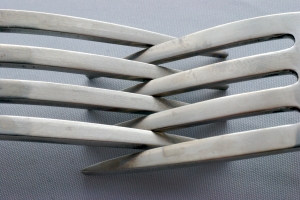There has been a certain velocity to my life. A lot of going and going and going. I was on an anti-anxiety med a while back and finally went off of it simply because I missed the going. But it’s been a tortured relationship, me and going. I have a very hard time ungoing, or even slowing down. This characteristic is helpful when it comes to professional accomplishment, and even in some aspects of house and home accomplishment, but it is rather an affliction if one wishes to avoid burnout or stress, or to live life more fully. (I don’t say anything about “balance” here largely because I believe it to be an elaborate hoax, a sham manufactured for purposes of blaming individuals for the high-intensity, over-stressed lives in which we must function, and for selling ostensibly balancing products and services, rather than taking a serious look at how social forces shape our lives and could very well shape them differently if we would quit dumping responsibility for social problems in the laps of individuals and families.)
This going is something I acquired from my mother in large part I think, and I’ve been reflecting on this fact the past week after we spent some time together at the beach. I think my acquisition of it is not simply about her having modeled a life of movement but also about genetics too a bit. I’m rather wired toward movement, as she is; she seems to have acquired this wiring from her father. We were sitting one morning down at the beach, having coffee in aqua adirondock chairs and coffee mugs that matched them, and I was making some list of something—lists of somethings being an anchor for my life—and she made a comment to the effect of “You are always thinking. It’s no wonder you accomplish so many things. And then you do the things you were thinking about. I can’t think and do that much.” I replied, “Well, now, maybe. But you’ve lived most of your life going and going. Where do you think I got this from? I learned this directly from you.”
That conversation made me think about her life as having historically been perpetually in motion. And about how sometimes she was hard to be with, given all that motion. And about how one of the advantages of her slowing down some at this point in her life is that there is more stillness and more opportunity to be near, and tranquil, and in deeper communion with her. I thought too that it must be hard for my own children to be with their mother, given all my motion. About the very real possibility that there is little opportunity for them to be still and tranquil with me. And I’m wondering if I should be doing something about that, or if it is a matter of life stages and transitions that evolve on their own. I suspect the answer lies somewhere in between.
I do have very vivid memories, despite my mother’s inclination toward movement, of time when we’ve been still together. I remember a period of time just before kindergarten, when we were home together; me playing and her near, and she made my lunch in my new lunchbox and thermos because I insisted on practicing with it before I went “off” to school. I remember too the times, I suppose around the same period, that we got “up in the bed” for a nap in the afternoons (I realized recently that in our family one gets “in the bed” at night but “up in the bed” during the day) and she would read to me from our red hardcover book of childrens’ stories. I loved the sound of her voice, there with those stories, and too when she sang hymns at church. I get misty-eyed thinking about how her voice soothed me so. Those hot south Florida days on our screened back patio and up in the bed are placid in my memories. I remember fondly too the times, when I was in elementary school and she would drive on field trips. She didn’t do them all the time and maybe not even often, but I liked having here there, much more than she liked me volunteering her for the job, I learned. Ours was a time when parents did not feel compelled to attend en masse their children’s every activity like field trips. (Oh for the days.) I remember a day of errands when we bought donuts and ended up eating the whole dozen by the end of the day, just the two of us. A ridiculous indulgence that we still talk about in mild disbelief. I remember a time when she would go jogging and I got up with her a couple of times to jog with her in the early dawn. When I was fourteen she took me to a fancy restaurant and we had cold daiquiris and hot popovers on pink tablecloths. I remember too that she took me to my first gynecology appointment and to get contraception, and that she drove me to my college orientation and we stayed in the dorm room together. And now I add to that list, which gets longer as I tap my memory, our recent trip to the beach, where we talked all the way down there and back as my son slept in the back seat with his iPod. Or maybe it was mostly me talking. And we ate hard boiled eggs and PB&J and grapes and apples and cheese. And we laughed and we laughed as we always do. I hope my own children can build a list from their memories of unruffled time with me. I suspect it won’t be a long list but I hope it doesn’t leave them pining after time with their mother, ungoing.




